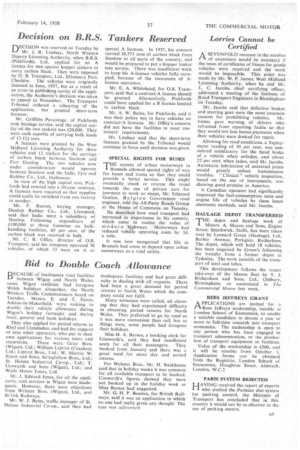Decision on B.R.S. Tankers Reserved
Page 43

If you've noticed an error in this article please click here to report it so we can fix it.
DECIS1ON was reserved on Tuesday by Mr. J. R. Lindsay, North Western Deputy Licensing Authority, when B.R.S. (Pickfords), Ltd.. applied for an A licence for two special hopper tankers to carry carbon black. They were opposed by 0. B. Transport. Ltd., Ellesmere Port, Cheshire. The vehicles were originally licensed in June, 4957, but as a result of an error in publisloing notice of the application, the Authority's decision was taken to appeal in November. The Transport Tribunal ordered a rehearing of the application, but granted short-term licences.
Mr. Griffiths Parsonage. of Pickfords tank haulage service, said the capital outlay ori the two tankers was £20,000. They were each capable of carrying bulk loads of 12-121 tons.
A licences were granted by the West Midland Licensing Authority for three vehicles and 12 trailers for the carriage of carbon black between Stanlow and Fort Dunlop. The two vehicles now under consideration would operate between Stanlow and the India Tyre and Rubber Co., Ltd., Inchinnan.
In view of the high capital cost. Pickfords had entered into a 10-year contract. A licences were required so that supplies could easily be switched from one factory to another.
Mr. F. Reeves, buying manager, Dunlop Rubber Co.. Ltd., Liverpool, said that India were a subsidiary of Dunlop. Following expenditure of £100,000 at three factories on bulkhandling facilities, 60 per cent, of the carbon black was received in bulk.
Mr. C. B. Offiey, director of O.B. Transport, said his company operated 38 vehicles, of which 33 were on A or special A licences. In 1957, his concern carried 28,573 tons of carbon black from Stanlow to all parts of the country, and would be prepared to put a hopper tanker into service. There was insufficient work to keep his A-licence vehicles fully occupied, because of the incursions of Alicence operators.
Mr. E. A. Whitehead, for O.B. Transport, said that a contract-A licence Should be granted. Alternatively, Pickfords could have applied for a B licence limited to carbon black
Mr. A. W. Balne, for Pickfords, said it was their policy not, to have vehicles on contract-A licences. Mr. Offle'y's concern did not have the facilities to meet customers' requirements.
Mr. Lindsay said that the short-term licences granted by the Tribunal would continue in force until decision was given.
SPECIAL RIGHTS FOR BUSES THE system of urban motorways in
Brussels allowed special rights of way for buses and trams so that they could provide a better service. This might eventually check or reverse the trend towards the use of private cars for journeys to work or shops, Mr. Edmond Goelen, Belgian Government road engineer, told the All-Party Roads Group at the House of Commons on Tuesday.
He described how road transport had increased in importance in his country, which came to realize the value of modern highways. Motorways had reduced vehitle operating costs by 3d. a mile.
It was now recognized that life in Brussels had come to depend upon urban motorways as a vital utility.




















































































































